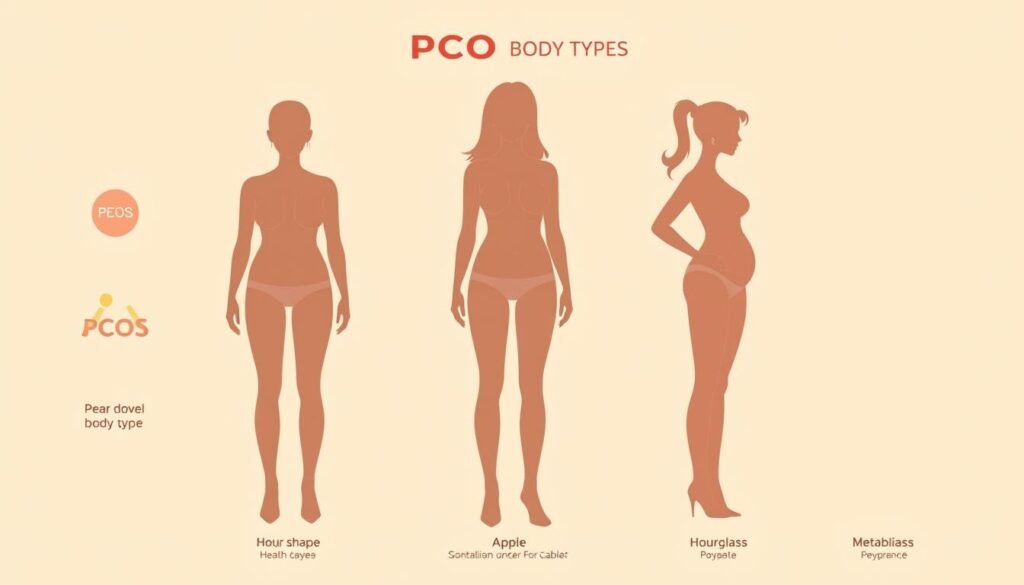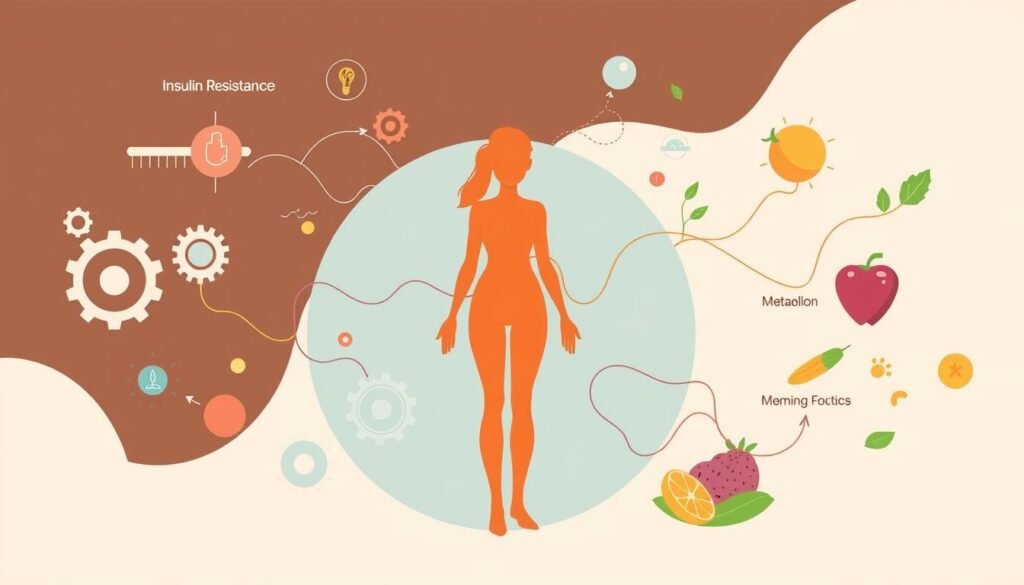About 5 to 10 percent of women in their childbearing years have Polycystic Ovary Syndrome (PCOS). This complex hormonal issue can affect fertility. It also raises the risk of serious conditions like type 2 diabetes and heart disease. Knowing how PCOS body type correlates with symptoms is key for managing it effectively.
With lifestyle changes and possible medical treatments, women with PCOS can better their health and life.
Key Takeaways
- PCOS affects around 5 to 10 percent of females, highlighting its prevalence.
- Women with PCOS are at higher risk for type 2 diabetes, heart problems, and metabolic disorders.
- Regular lifestyle changes, such as a healthy diet and exercise, can significantly help in managing symptoms.
- Insulin resistance is common, making weight management a key focus in PCOS management.
- Women experiencing PCOS should be aware of potential complications, including issues with fertility and menstrual irregularities.
What is Polycystic Ovary Syndrome (PCOS)?
Polycystic Ovary Syndrome, also called PCOS, is a hormonal issue in women who are able to have children. The PCOS definition includes many symptoms that can mess with both daily life and health over time. Some of the main symptoms are irregular periods, gaining weight, having too much body hair, acne, and possibly not being able to have babies.
This problem starts when there’s a hormone imbalance that messes up the process of ovulation. If diagnosed with PCOS, women often have more androgens, which could be due to insulin resistance. Therefore, having certain genes or living a certain lifestyle, like being overweight, can make it more likely to get this syndrome.
Most of the time, symptoms show up in the late teens or early 20s. Finding out if you have PCOS is important. It can include getting ultrasounds to check for cysts on the ovaries and blood tests for hormone levels. If not treated, PCOS can lead to serious problems like type 2 diabetes, heart problems, and even cancer of the endometrium.
To learn more about PCOS and how it affects people, you can check out this resource. Understanding PCOS can help women get the help they need in time to better manage their symptoms.
Causes and Risk Factors of PCOS
Understanding PCOS causes means looking into many factors. The exact origins are still not clear, but several elements seem important. One big factor is insulin resistance and PCOS. When the body can’t use insulin well, levels of insulin and androgen go up. This imbalance can cause irregular periods and more weight gain.
Genes play a big role in PCOS risk. Studies have found 19 genes that might increase this risk. Interestingly, these genes affect not just women, but men too, leading to similar heart and metabolism issues. Depending on these genes, a person might get one of the PCOS types, affecting reproduction or metabolism.
Being overweight is a major PCOS risk factor. It makes insulin problems worse and adds to PCOS symptoms. Being exposed to a lot of androgen hormones early on, even in the womb, might make PCOS more likely later. High androgen levels can stop ovulation and cause more hair growth and acne.
Problems with insulin are common, resulting in conditions like acanthosis nigricans, a skin issue. The link between insulin levels and more androgen makes PCOS symptoms worse. It’s known that between 5% and 15% of women of childbearing age in the US have PCOS. That’s about 5 million women.
| Factor | Description | Impact on PCOS |
|---|---|---|
| Genetic Variants | Identified variations linked to PCOS in both genders | Increased risk and symptom severity |
| Insulin Resistance | Ineffective use of insulin in the body | Higher testosterone levels and irregular ovulation |
| Obesity | Excess body weight influencing hormone balance | Worsening insulin sensitivity and PCOS symptoms |
| Androgen Levels | Elevated male hormones in females | Causes symptoms like acne and hirsutism |
Symptoms of PCOS: Recognizing the Signs
Polycystic Ovary Syndrome (PCOS) shows a variety of *symptoms* that differ widely among women. A common sign is an irregular menstrual cycle. This is often seen as a key PCOS sign. Many women have missed periods or unusually long cycles.
Excess body hair growth, or hirsutism, is another clear symptom of PCOS. It often occurs on the face and abdomen. Acne can also flare up due to the PCOS hormonal imbalance. This imbalance might even cause hair thinning. These issues are a major source of distress for many.
PCOS can lead to skin problems like dark patches or skin tags. These issues suggest insulin resistance, a common PCOS problem. The risk for serious conditions like type 2 diabetes and heart disease increases. Knowing the *symptoms of PCOS* is crucial. It helps people get early medical advice and take charge of their health.
PCOS Body Type and Body Composition
Women with Polycystic Ovary Syndrome (PCOS) often deal with unique body challenges. Their body type and fat distribution affect their health. Knowing about these can help manage PCOS effects better.
Understanding PCOS Body Shape
In the US, many women with PCOS have what’s called an “apple shape.” This means they carry more fat in their belly area. Up to 80% of women with PCOS in the country are obese. But, even those who are not obese face health risks like hormonal imbalance. It’s important to know your body shape to tackle PCOS effectively.
Impact of PCOS on Body Fat Distribution
Women with PCOS often have more belly and organ fat. This kind of fat is linked to insulin resistance and metabolic issues. Measuring the waist and comparing it to the hips help understand health risks better. It shows how PCOS fat distribution affects health.

Insulin Resistance and Hormonal Imbalance in PCOS
Insulin resistance is a big problem for women with Polycystic Ovary Syndrome (PCOS). It can cause higher insulin levels, making weight gain worse. Together with insulin problems, PCOS also leads to more androgens. These can cause issues like lots of hair growth and acne.
The link between insulin resistance and hormonal imbalance in PCOS is clear. High androgen levels can stop ovulation, leading to infertility. Studies show that women with typical PCOS signs often have higher insulin levels. This shows a clear connection between insulin resistance and PCOS.
To deal with PCOS, managing insulin resistance is key. Being active and eating healthy can really help improve insulin sensitivity. These changes can lower the chances of further problems, like PCOS and diabetes risk. Focusing on weight and BMI can improve health outcomes greatly.
| Health Concern | Impact |
|---|---|
| Insulin Resistance | Increases insulin and androgen levels, exacerbating PCOS symptoms. |
| Weight Gain | Leads to further insulin resistance and complicates weight management. |
| Hormonal Imbalance | Disrupts normal ovulatory cycles, increasing infertility risk. |
| Long-term Diabetes Risk | Over half of women with PCOS may develop type 2 diabetes by age 40. |
For women with PCOS, handling insulin resistance can majorly boost their life quality. They can feel more in control of their health. For deeper info on insulin resistance and hormonal imbalances, visit studies on diagnostic criteria. These resources offer detailed insights into PCOS.
Adding healthy habits is critical for managing PCOS well. Regular exercise and a good diet can help lose weight and increase insulin sensitivity. This reduces long-term health risks. For tips on tracking weight and BMI in PCOS, check tracking guidelines for effective management.
Effects of PCOS on Metabolism
Polycystic Ovary Syndrome (PCOS) affects metabolism, making it hard to control body weight and muscle tone. Women with PCOS often struggle with their metabolism. This can lead to PCOS weight gain. It’s key to grasp these issues for better management.
PCOS and Weight Gain
Many women with PCOS gain weight, especially around the belly. This is mainly because of insulin resistance, which is common in PCOS. It makes the body store more fat. So, handling this imbalance is crucial.
PCOS and Muscle Mass
Women with PCOS might also find it hard to build and keep muscle. Hormone changes from PCOS can slow muscle growth. This affects the body’s composition and metabolism. Making changes in lifestyle can help. It improves insulin sensitivity and supports metabolic health. For extra information on this, check out studies here.

Diagnosis of PCOS: What to Expect
Diagnosing PCOS is not straightforward because its symptoms often mimic other conditions. Initially, doctors gather your medical history and conduct a physical checkup. Pelvic exams help them spot PCOS signs like irregular menstrual cycles and more.
When diagnosing PCOS, specific testing for PCOS is essential. Blood tests look for abnormal hormone levels, such as androgens and insulin. An ultrasound may be done to find ovarian cysts and check the lining of the womb.
For a PCOS diagnosis, a woman must show at least two of these issues:
- Irregular ovulation
- Signs of high androgen levels
- Many small cysts on the ovaries
Talking openly with your doctor about your symptoms and history is crucial. This conversation ensures a careful assessment. It leads to an accurate PCOS diagnosis and treatment plan. Getting diagnosed correctly is key to managing your health and improving your life.
| Diagnosis Method | Description |
|---|---|
| Pelvic Exam | Physical examination to identify irregularities |
| Blood Tests | Measure hormone levels, including androgens and insulin |
| Ultrasound | Detect ovarian cysts and evaluate the uterine lining |
Management Strategies for PCOS
Managing Polycystic Ovary Syndrome (PCOS) means combining lifestyle changes for PCOS with the right medical treatment. Everyone’s PCOS journey is different, so we need personalized plans. These help reach the best results.
Lifestyle Changes: Diet and Exercise
What you eat is key in handling PCOS symptoms. Eating a balanced diet helps control insulin and manage weight. It’s good to eat fruits, veggies, whole grains, and lean proteins. Also, regular physical activity improves insulin sensitivity, promotes weight loss, and boosts metabolism. Starting a workout program, even for 24 weeks, can make periods and ovulation more regular for women with PCOS.

Medications to Manage PCOS Symptoms
Next to changing your lifestyle, certain medications for PCOS can lessen symptoms. Birth control helps balance hormones and lowers endometrial cancer risk. Metformin and Clomiphene boost ovulation. Spironolactone may cut down on excessive hair growth. For looks, some might consider laser hair removal. Talking to doctors about these options is key. They’ll guide you based on your symptoms and goals.
For more on managing PCOS, check out these detailed resources.
Living with PCOS: Emotional and Physical Challenges
Living with PCOS brings big emotional and physical challenges. It affects about 7% of women in the U.S. during their childbearing years. These women often feel anxious or depressed. This can range from a little to a lot. Anxiety disorders are found in 28% to 39% of affected women. Meanwhile, 11% to 25% may experience depressive disorders.
PCOS can cause excessive hair growth and acne. This leads to negative feelings about one’s body. It makes people very self-aware and lowers their self-esteem. The hormone imbalances make it hard to keep a healthy weight. This can make emotional issues even worse.
Handling the emotional side of PCOS needs a well-rounded plan. Help from healthcare experts is key. They manage both the mind and body issues. Peer support groups provide comfort and understanding through shared experiences. Cognitive Behavioral Therapy (CBT) also helps reduce anxiety and depression in PCOS sufferers.
Understanding PCOS helps build a supportive community. It urges women to seek help and take good care of themselves. This approach helps strengthen emotional wellbeing. It helps women handle the emotional and physical issues that come with PCOS better.
Conclusion
Understanding PCOS and its effects is crucial for women facing it. A complete PCOS overview shows early detection and management can ease symptoms. It also lowers risks of heart diseases and diabetes. Knowing the symptoms helps improve health outcomes.
PCOS awareness is very important. Informed women are more likely to get support and talk openly with doctors. This is key in managing PCOS well. Treatments might include lifestyle changes or medicine. Recent studies show that dealing with body image issues can ease anxiety and depression in women with PCOS. Thus, mental and physical health are both important in treatment plans. For more information, read this important study.
Being involved in health management improves life quality. It also builds a community for those with this widespread endocrine disorder. By sharing knowledge and experiences, women can better handle PCOS’s challenges. This helps them thrive, not just survive.